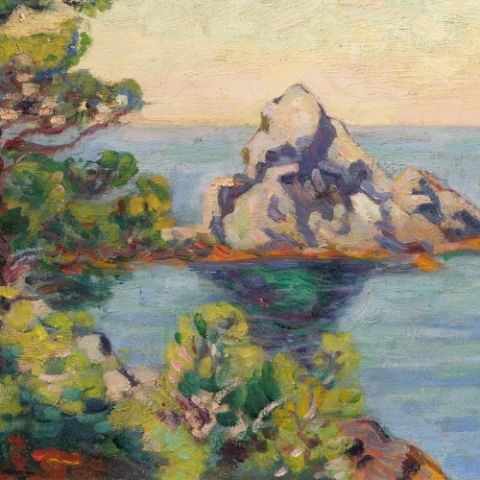
Lot was sold
Lot 45 | Anthony Claesz II. | A Bouquet of Tulips, Roses, Daffodils and Carnations in a Glass Vase
Estimate
40.000
- 60.000
€
D
Result:
(incl. premium)
39.600 €
CLAESZ II, ANTHONY
Amsterdam 1607 - 1649
Title: A Bouquet of Tulips, Roses, Daffodils and Carnations in a Glass Vase.
On the table insects and a snail.
Technique: Oil on wood.
Measurement: 49,5 x 36,5cm.
Notation: Signed and dated lower right: A. Claesz fecit 1643.
Frame: Framed.
Provenance:
Private ownership, Germany.
On a marble balustrade stands a crystal vase in which spring and summer flowers are placed with discreet elegance: We see, among others, lilies of the valley, tulips, anemones, lilies, daffodils and irises, bursting and full of life. This is an illusion, however, because some flowers have already begun to lose their petals. In this floral tangle, some insects move about undisturbed, unaware that they are being portrayed, intent on feeding or getting over the balustrade that separates the space of the painting from the viewer.
The creator of this painting is a true specialist in the art of depicting flowers: the Dutchman Anthony Claesz II lived for just over forty years and was mainly active in Amsterdam, with a stay in England documented for the year 1632. He was a pupil of Balthasar van der Ast, but was also influenced by Hans Bollongier. His main subjects were still lifes with flowers and fruits. He made numerous sketches of individual flowers, especially tulips, in which the artist captured not only the flower's blooming essence but also its personality. Only a few paintings by him exist, and they very rarely reach the art market.
The present painting is therefore a first, especially since - as the date of 1643 reveals - it was painted six years before the artist's death. The work thus summarises the artist's botanical knowledge and illustrates his sensitivity in giving each flower a different character.
Among the most important flowers in this crystal vase are the tulips, which Claesz II also often executed as single flowers. These remind us that we are in the years of the so-called Tulip Mania, a period of the Dutch Golden Age when the contract prices for certain tulip bulbs were exorbitantly high, which is why these flowers occupied a prominent position in contemporary painting. The great boom began in 1634 and then collapsed dramatically in February 1637. It is generally regarded as the first speculative or asset bubble in history.
We are grateful to Fred G. Meijer, Amsterdam, for confirming the attribution of the present painting on the basis of a high-resolution digital photograph.
Amsterdam 1607 - 1649
Title: A Bouquet of Tulips, Roses, Daffodils and Carnations in a Glass Vase.
On the table insects and a snail.
Technique: Oil on wood.
Measurement: 49,5 x 36,5cm.
Notation: Signed and dated lower right: A. Claesz fecit 1643.
Frame: Framed.
Provenance:
Private ownership, Germany.
On a marble balustrade stands a crystal vase in which spring and summer flowers are placed with discreet elegance: We see, among others, lilies of the valley, tulips, anemones, lilies, daffodils and irises, bursting and full of life. This is an illusion, however, because some flowers have already begun to lose their petals. In this floral tangle, some insects move about undisturbed, unaware that they are being portrayed, intent on feeding or getting over the balustrade that separates the space of the painting from the viewer.
The creator of this painting is a true specialist in the art of depicting flowers: the Dutchman Anthony Claesz II lived for just over forty years and was mainly active in Amsterdam, with a stay in England documented for the year 1632. He was a pupil of Balthasar van der Ast, but was also influenced by Hans Bollongier. His main subjects were still lifes with flowers and fruits. He made numerous sketches of individual flowers, especially tulips, in which the artist captured not only the flower's blooming essence but also its personality. Only a few paintings by him exist, and they very rarely reach the art market.
The present painting is therefore a first, especially since - as the date of 1643 reveals - it was painted six years before the artist's death. The work thus summarises the artist's botanical knowledge and illustrates his sensitivity in giving each flower a different character.
Among the most important flowers in this crystal vase are the tulips, which Claesz II also often executed as single flowers. These remind us that we are in the years of the so-called Tulip Mania, a period of the Dutch Golden Age when the contract prices for certain tulip bulbs were exorbitantly high, which is why these flowers occupied a prominent position in contemporary painting. The great boom began in 1634 and then collapsed dramatically in February 1637. It is generally regarded as the first speculative or asset bubble in history.
We are grateful to Fred G. Meijer, Amsterdam, for confirming the attribution of the present painting on the basis of a high-resolution digital photograph.
Contact:
Print this lot | Recommend lot |
Conditions of this Lot
VAT margin scheme, VAT included, but must not be indicated, not refundable
32% buyer’s premium on the hammer price
32% buyer’s premium on the hammer price
Similar works in the auction
Anthony Claesz II. The Netherlands Dutch School 17th C. Old Masters Still Life Painting Flowers
Anthony Claesz II. The Netherlands Dutch School 17th C. Old Masters Still Life Painting Flowers
Stock Id: 76147-1


